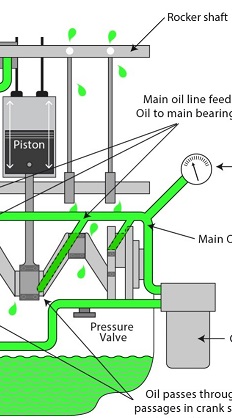Learn about Machines - how they work, how to maintain them and more.
 Learn to understand different machinery.
Learn to understand different machinery.
- Learn how to service them.
- Learn how to extend their life by repairing them.
Mechanics is the study of machines, and this course is relevant to both the simple such as household appliances, to the complex, such as automobiles.
Machines have become so much a part of modern life that we can easily take them for granted. Most people don’t even give a second thought to how the machines they use are functioning; that is until they stop functioning.
Learning more about mechanics can enable you to do so much more with machines though, from using them more appropriately and safely to maintaining and repairing them when required.
Some machinery is relatively simple and easier to learn about, but other machines can be much more complex and will require far more learning and experience to properly understand.
This course lays a foundation for understanding and working with all machines, each lesson building upon what you learnt in the previous ones, gradually expanding your awareness and understanding of how and where engines can be used to power machines, and how different types of machines function.
COURSE CONTENT
This course has 8 lessons as follows:
Lesson 1. Introduction to Engines and Motors
- Introduction
- Power Sources
- Engines
- Steam Engine
- Petrol
- Engine Operating Cycle
- Engine parts
- Four stroke Ignition Engine Cycle
- Two Stroke Ignition Engine Cycle
- Electric motors
- Parts of an electric motor
- AC and DC motors
- Induction and Synchronous motors
- Applied tasks - Changing a wheel, Mending a puncture
Lesson 2. Engine Characteristics
- Measurements and mechanical principles
- Force, Load, Pressure
- Atmospheric pressure, Absolute pressure
- Force of gravity, Centre of gravity, Specific gravity
- Density, Vacuum, Volumetric efficiency
- Work, Power, Energy
- Pistons - motion, bore, piston displacement
- Compression ratio
- Engine efficiency
- Features of electric motors
- Applied tasks - spark plugs
Lesson 3. Machines and their parts
- Parts of a machine
- Engine systems
- Lubrication system
- Cooling system
- Fuel system
- Transmission -gearbox, clutch, transmission, drive shaft, PTO
- Power source
- Ignition system - distributor, Coil pack
- Other machines
Lesson 4. Drive Mechanisms -Transmissions, Gears, Belts
- Introduction
- Cog drive machinery
- Belt drive machinery
- Transmission drive machinery
- The transmission system
- Clutch
- Gearbox
- Differential unit
- Applied tasks - replacing drive belts
Lesson 5. Managing Deterioration
- Splash feed lubrication system
- Pressure system
- Combination pressure and splash
- Oil contamination
- Cooling system - air cooling, water cooling
- Lubrication - oil viscosity
- Types of filter systems
- Materials deterioration
- Properties of materials - metals, non ferrous alloys
- Seals
- Applied tasks: servicing filters
Lesson 6. Optimising Function and Longevity
- Adjustments
- Controlling power
- Carburettors - float system, number of barrels, injectors
- Lubrication
- Exhaust systems
- Catalytic converter
- Muffler
- Extractor
- Turbocharger
- Intercooling, waste gate, blow off valves, twin vs single turbo, boost controller
- Superchargers
- Applied tasks - servicing a carburettor
Lesson 7. Brake Systems
- Introduction
- Drum versus disc brake
- Drum brakes and shoe pad
- Disc brakes
- Pneumatic, Hydraulic and Electric Brakes
- ABS - Anti lock brake system
- Regenerative braking
- Applied tasks - servicing brakes
- Jacking up a vehicle
- Changing disc brakes
- Changing drum brakes
- Motor cycle and push bike brakes
Lesson 8. The Mechanics Workshop – equipment, tools, safety etc
- Introduction
- Tool maintenance
- Work bench
- Vices and clamps
- Lifts, ramps, jacks, ladders
- Tightening pullers
- Pulleys
- Winches
- Generators, battery chargers
- Cleaning equipment
- Grinders, sharpening equipment
- Work pits, hoists
- Measuring equipment
- Hand tools
- Spanners and Allen keys
- Pliers and grips
- Screwdrivers
- Files
- Cutting equipment
- Hammers, chisels, punches
- Tap and die cutters
- Lubrication equipment
- Power tools - Drills, saws
- Soldering and welding
Lesson 9. Maintenance and Repair
- Introduction to maintenance
Servicing a typical motor car
Changing spark plugs
Inspect collant levels
Inspect tyre pressure
Change fuel filter
Brakes and brake fluid
Wheel alignment
Power steering fluid
Electrics
Servicing Garden Equipment
Oil & Dirty Spark Plugs
Mowers
Chainsaws
Outdoor Electric Machines
Treating Rust
Painting Metal
COURSE AIMS
- Explain how different types of engines and motors work.
- Describe the features that differentiate the quality and work capacity of engines.
- Describe the scope and nature of components of a machine.
- Explain different ways of converting the movement of energy to perform useful work tasks.
- Describe how machinery can deteriorate over time, and responses to both prevent and repair deterioration.
- Explain how engines and motors have their power output regulated.
- Explain the mechanisms used to slow or stop any form of motion by applying force.
- Describe machinery workshop tools and equipment, and explain their safe and appropriate use in maintaining and repairing machinery.
Machines and Tools
Buying or making a machine, maintaining and repairing machinery requires a well organised and equipped workshop.
This course helps you to not only understand machines, but also the tools used to work with machines, and what tool is appropriate for what job.
Every job you undertake may be achievable with a variety of different tools, but to do the job properly and achieve the best result with the least effort, you should use the best tool for the job and not just an “acceptable compromise”.
To choose the best tool for any job you need to understand all of your equipment options, the techniques for using that equipment, and what is needed to keep that equipment in good condition.
Consider the following:
- Strong tools will take greater physical stress and handle heavier jobs without breaking (e.g. if you buy a cheap tool built with cheap materials it might not last till the end of the first day, particularly if you are doing heavy work)
- Sharp tools put less stress on the tool and less strain on YOU the user.
- Long handles give you greater leverage and increased reach, putting less strain on your back and other parts of your body.
- When you pay more for a tool, you are usually paying for long hours of thought which have gone into its design. Tools which do the job better and more easily are generally the more expensive ones.
- If your work is heavy, your tools are likely to be strained more you will need better quality tools.
- Metal tools made with stainless steel or aluminium do not corrode like those made with other metals.
Tool Maintenance
Looking after your tools is very important. If you look after them then they don't have to be replaced as frequently. Tools in good condition are easier to use, they are also generally safer. Some simple reminders are listed below:
- Metal: to prevent rust or corrosion metal either needs painting with a good metal primer, or regular coating with oil (After using, clean and wipe metal parts with an oily rag).
- Sharpening: sharp tools require less effort to use and because of this there is also less strain on the user.
- Washing: If tools are kept clean they are less likely to corrode or have moving parts seize. This also reduces the likelihood of pests and diseases being spread from infected areas to uninfected areas.
- Storing: by keeping your tools stored properly means they are less likely to be damaged, lost or stolen. Tools left lying around can also be dangerous, particularly if you have young children, or they can be used by burglars to break into your house, garage, sheds. In larger rooms or buildings, tools may be locked in cupboards or inside a caged area to provide added security.
Tools and equipment for mechanics work fall into three categories:
1. General Equipment.
2. Hand Tools.
3. Power Tools.
HOW THE COURSE WORKS
You can start the Mechanics course at any time.
It is studied by distance learning, so you can study in the comfort of your own home. But this doesn't mean you are all alone in your studies. Our highly qualified and friendly tutors are there to help you every step of the way. If you have any questions at all, they are always happy to help.
Each lesson includes set tasks, and is completed with an assignment which the student submits to their course tutor. The tutor will mark the assignment and return this to the student with comments and suggestions for further reading.
STUDYING WITH ACS
Quality courses - expert tuition - unlimited support.
At ACS we provide you with more than just a set of course notes.
Your 'learning package' includes:
- Course notes.
- Self-assessment quizzes.
- Assignment feedback.
- You can interact one on one with a professional tutor with decades of experience - just email, phone or log on to chat to connect with them.
Enrolling is easy - just select your payment option and study method - choose the online option for a 5% discount on the course cost.
Any questions?
Our tutors are more than happy to help and advise you with any questions regarding the course. Please contact us if you have any questions at all.
If you want to know more about machines, how they work and how to maintain and repair them, then this is a great course for you.
Study when and where you want to. Why delay? Enrol today!
Contact Us
Use our FREE COURSE COUNSELLING SERVICE to connect with our expert tutors.
By Email:info@acsedu.co.uk
By Phone: (UK) 01384 442752
Stay in touch, follow us on
Twitter
Facebook
Google